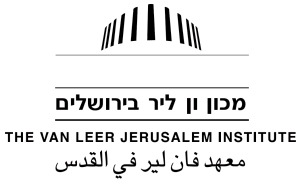On this plenary session at the 2018 annual conference of the Association for Israel Studies, recorded at the University of California at Berkeley, Tel Aviv Review host Gilad Halpern, Prof. Chana Kronfeld and Dr Yael Segalovitz discuss the attempts to “de-ghettoize” Hebrew literature and study it in a broader and richer context, as well as the intercultural exchanges with other types of literature, Jewish and non-Jewish.
Sponsors
This season of the Tel Aviv Review is made possible by The Van Leer Jerusalem Institute, which promotes humanistic, democratic, and liberal values in the social discourse in Israel.
Tel Aviv Review is also supported by the Public Discourse Grant from the Israel Institute, which is dedicated to strengthening the field of Israel Studies in order to promote knowledge and enhance understanding of modern Israel.








Fabulous program!
“Walking….speaking the text until something comes up.”
–one of the discussants
—
While the context is a translator in thought, the image speaks as well to the actualized written word generally, traveling through us until an instantiation, a merging is found. We think we speak, but I often feel as though I am a conveyance for speech, owned physically as utterance but not as social or cultural instance, to claim title nearly fraudulent. I am their tool, a rather blunt one, asked to stay on script written elsewhere. Authorhood becomes talk of a distant god, only the text, linked words, before us. They take on an independent existence by being dependent on us, but no me–the text is always elsewhere besides with me, so cannot be mine; from this it comes to control me more than I use it.
Texts enlarge social and cultural space. Placed as objects beyond their creator, they expand the space in which we may live. Consider the expansion of the universe: matter rushing outward, away from its center called past–but to where? Space/time is relativized to matter; it does not exist as an empty container in which the spill of existence expands. Matter rushes outward, toward nothing, never able to reach it, creating new space in the rush. Texts do something a bit similar. They expand the space in which we can walk, creating pathways through linkage, linkages we must make, to other texts; the more pathways, the more of us can walk therein, spying more texts, objects, for destination, or travel thereto often in yet more text producing in turn more linages, density unbound.
This is acutely evident in academics. The creation of points of “subversion” (a word used in the discussion) enlarges oral and written discourses for being. Dominance is decried in literary criticism in part, I think, because thereby more critics have a place to be. Texts subverting or refusing dominance are expansive for the critic; there are new topics, so new talks, new papers, books (more space creating texts!), portending a sustained life for the critic while not choking other critics. I doubt Kafka had this in mind when he wrote, but there is now a Kafka academic journal, and so, so many books. James Joyce, though, predicted academics would speak of him for decades, perhaps offering his text as a future universe for academic survival.
This expansion of space to survive and yet compromise with others’ survival happens in science as well. Biologists often focus on just a few species, really just a few aspects of a few species, thereby expanding the space of survival for themselves, providing new terrain for the same act by others. Theory is more destructive professionally; the more general the model, the fewer other voices may be heard, save in secondary, “derivative” place. In consequence, obscure, arcane models result as people struggle for that place called tenure while making as few enemies as possible, models lost to sight quite quickly. Yet the universe of articles expands, new space is made, ready to be walked by others in the same pursuit later. Academics is in no small part a flight from fellows for mutual survival, knowledge the space thereby made. To know is, in fine, to distance oneself from the competitive necessities of others; when not, the blood of lost money flows. For all the joy flowering in academic discourse, there are those not there, death, socially but not physically. The discourse, the space enlarger, uses us, some fairing well thereby, some vanished.
There is no escape. Space creation is as good as we get, but it is not an inclusive heaven made by God. We cannot exit evolution, its tool in a creation without author, yet with authors everywhere. But what of the book, poem that critics grasp to make a space, the original text, before industrial comment, a Kafka writing unread? Perhaps that is escape from evolution, for the author. Yet not for us. His escape becomes our evolutionary dynamic, putting bread and status and happiness on our tables. The Book of Jabes continues its self writing, escape captured so future can be.
Hello,
As comp lit specialist who has recently taken interest in cosmology, I recently learned that our galaxy (the Milky Way) is moving at a speed of approximately 1 million miles per hour towards a cosmic “structure” named the Great Attractor, which is a cluster of black holes, quasars, and other matter considerably larger than the Milky Way. (In this sense, our galaxy is not headed, at least in any immediate sense, towards “nothing.”) The Milky Way is approximately 100,000 light years across. The Great Attractor is 400,000,000 light years across. Also worth knowing is the fact that our solar system is revolving around the supermassive black hole at the center of the Milky Way at a speed of 500,000 miles per hour. (The earth revolves around the sun at 67,000 miles per hour).
Just a few basic facts to keep in mind when discussion of our galaxy and its movement comes up.
Best to all,